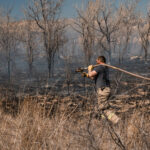U.N. climate talks remained deadlocked on Wednesday over a debate on the agenda for negotiations, with developing countries pushing hard for a greater focus on the fate of the Kyoto Protocol.
The April 3-8 talks in the Thai capital are part of a long and often troubled negotiation trying to strengthen the global fight against climate change by deepening greenhouse gas curbs by the world’s major economies.
Kyoto is the only pact with legally binding targets for about 40 rich nations up to 2012. No successor agreement is in sight and many developing nations say the talks need to step up a gear to decide on a pact to begin in 2013 to avoid a gap.
“It’s worrying. It’s a step backwards,” said a delegate from a large developing nation who didn’t want to be identified because of the sensitivity of the talks to try to agree on an agenda likely to shape negotiations for the rest of the year.
During a late night debate on Tuesday among delegates from more than 170 nations, developing countries welcomed progress made at last December’s meeting in the Mexican resort of Cancun, which led to a series of agreements widely seen as saving the process from collapse.
But developing country delegates said the current gathering must focus on the issues that Cancun put to one side, including the fate of Kyoto and the need for rich nations to step up carbon cuts.
This leads to the risk that the talks could slip back into a mindset of trying to solve all issues at the same time, a step the United Nations last year said could cripple the negotiations. The Cancun agreements enshrined a step-by-step process to win agreement on different issues.
Poorer nations in their proposed agenda on Tuesday said a major meeting in the South African city of Durban at the year’s end must solve the issue of whether or how to extend Kyoto into a second commitment period.
“Without some political solution to that issue, it may be impossible to move forward with implementing the Cancun Agreements,” said Elliott Diringer of the Pew Center on Global Climate Change.
“We may in other words revert to the mindset of binding-or-nothing and wind up with nothing,” he told Reuters.
Delegates were trying to craft a new agenda on Wednesday.
TOUGH ISSUES
The December deal in Cancun included a Green Climate Fund to manage $100 billion a year in aid to poor nations by 2020 and to limit a rise in average world temperatures to less than 2 degrees Celsius (3.6 Fahrenheit) over pre-industrial times.
It also won consensus on measures to protect tropical forests and a framework to help poorer nations adapt to rising seas and greater weather extremes.
The agenda for Bangkok, the first major climate meeting since Cancun, is meant to build on the December deal by filling in the details on getting these schemes operating.
But the 131-member G77 group of developing nations plus China said while Cancun was a good basis for talks, the tougher issues must be given much more focus and challenged the agenda presented by the chair of the meeting.
Many rich nations say they want a broader agreement that binds all big emitters to steps to curb greenhouse gas emissions. Japan, Canada and Russia are firmly opposed to the pact entering a second commitment period from 2013 while developing nations say Kyoto must be preserved.
“Mexico made progress but it didn’t solve everything,” Ian Fry, the delegate from the Pacific island state of Tuvalu, told the meeting late on Tuesday. “We have to resolve outstanding issues.”
India described the proposed agenda as Cancun-plus, but Russia and the United States firmly opposed it, saying it was a step backwards.
“The problem isn’t so much the agenda as the details can be fleshed out under any agenda,” said Jake Schmidt, international climate policy director for the Natural Resources Defense Council in Washington.
“The problem is that some developing countries want Durban to only resolve the issues that haven’t been resolved in the past and not implement Cancun. That is a recipe for disaster that will blow-up in South Africa’s face,” he told Reuters.
Was this article valuable?
Here are more articles you may enjoy.


 Uncertainty Keeps Prices Up; No Prior-Year Loss Development: Travelers
Uncertainty Keeps Prices Up; No Prior-Year Loss Development: Travelers  Coral Gables, Florida Tops Beverly Hills as Ritziest Home Market in US
Coral Gables, Florida Tops Beverly Hills as Ritziest Home Market in US  JPMorgan Client Who Lost $50 Million Fortune Faces Court Setback
JPMorgan Client Who Lost $50 Million Fortune Faces Court Setback  Wildfires Are Upending Some of the Safest Bets on Wall Street
Wildfires Are Upending Some of the Safest Bets on Wall Street 

